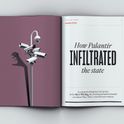We blew it on Brexit
I am partly to blame for the current mess over Brexit.
I not only backed Remain but launched the Labour “In” campaign alongside Alan Johnson, Jeremy Corbyn and Tom Watson. When the referendum result came through, I was disappointed.
But not for a moment did I think it wouldn’t be implemented. What happened in parliament over the next two years left me wondering if I’d left reality. I’m sad to say that I lost some friends over their call for a People’s Vote. I certainly had some bitter arguments with people whose past political achievements I profoundly respected.
Yet despite making speeches, writing articles and arguing ferociously internally that the outcome had to be upheld, I failed to put my money where my mouth was. I didn’t back Theresa May’s withdrawal agreement.
The one thing I would contest in the excellent piece by Jill Rutter and Anand Menon (“Who killed soft Brexit?” December) is their claim that Jeremy would never have voted for a deal. Myself and many of the other Labour MPs who respected the 2016 result met with Jeremy and his team regularly. I felt that he wanted to get a Brexit withdrawal deal through, so the party could campaign on austerity, the health service and all the other things on its electoral agenda. The fact that he was outmanoeuvred, and allowed securing a Brexit deal to be rebranded as “supporting a Tory Brexit,” is ultimately a failure of his leadership.
The irony is that today, even if we secure a trade deal in the final hours of negotiation, it will be far more of a Tory Brexit than a cross-party deal with May would ever have been. The Labour Party must take its share of the blame for Brexit’s final chapter.
Gloria De Piero was Labour MP for Ashfield 2010-2019
Hezbollah’s endurance
Lizzie Porter’s fine essay (“How the Arab world turned against Hezbollah,” November) is right to highlight the collapse in the popularity of Hezbollah, in a stricken Lebanon and across a region scarred with failing states in which the Iran-backed paramilitaries have intervened. But the Party of God’s trajectory has not been a straight line from hero to zero.
Hezbollah’s reputation was lifted by a wave of popular euphoria after it forced Israel out of Lebanon in 2000, ending a 22-year occupation. It alsoheld Israel to a draw in the 34-day war in 2006, even though many suspected that “divine victory” was in an unnecessary conflict it had inflamed. Still, a $5.7bn Gulf and European reconstruction package turned Lebanese eyesaway from the reckless adventurism.
Hezbollah’s intervention in Syria was different. It backed the sanguinary tyrant Bashar al-Assad’s war against his own people. There was palpable anger among Shia and Hezbollah families in Lebanon at the double-dealing of Syria’s hollowed-out army, as Porter reports. The movement’s support for lawless Shia militias in Iraq, and shielding of a kleptocracy of warlords and sectarian dynasts at home, underlined how it had become an Iranian satrap and spearhead in the Levant.
And yet. After Islamic State took Mosul in 2014, whenIraqi Shia militiamen hastened back to defend Baghdad, Lebanon could have been vulnerable to the jihadis. There was palpable relief—especially among Lebanese Christians allied with the party—that Hezbollah stood between them and Sunni jihadism.
After the cataclysmic chemical explosion in Beirut’s port in August, Hezbollah’s reputation could hardly be lower. But history shows it does go up as well as down.
David Gardner, International Affairs Editor, Financial Times
Curating double standards
Tristram Hunt’s article on the use of museums to propagate political messages (“Museum peace,” November) raises interesting questions. Among the exhibits Hunt focuses on at the V&A are a 15th-century casket, and gold and silver items from the Asante royal regalia. The former was once in the possession of a Jewish slave owner, and this is to be highlighted. The latter he sees very differently, as illustrating “imperial trophy hunting” and “exercises of colonial violence.”
But the Asante regalia too were linked with slavery, and far more directly than the casket: through the slave raiding, ownership and trading of the Asante kingdom itself. This was a polity founded on conquest and subjugation, described in one history of Africa as “a military society [with] a harshly militaristic ideology, and great brutality towards the weak.”
As Hunt notes, some symbols of power were confiscated by the British from the Asante rulers in a punitive expedition following repeated aggression against their neighbours. Will all this be explained by the V&A in its desire to show “what the profits from the exploitation of enslaved Africans ended up paying for” and to trace how “slave profits have seeped into the V&A galleries”? I can see no reference to slavery in the online catalogue of these Asante pieces. Is this simply an oversight, or does the V&A consider “the hideous provenance” of a Jewish slave owner’s wealth to be more noteworthy than that of African slave owners? If so, why?
Robert Tombs, historian, Cambridge
One nation lives on
One-nation Toryism dead? Come off it! Patience Wheatcroft’s column (“Opinions,” December) is not a description of the Conservative Party in 2020, it’s a parody only recognisable around the Hampstead dining table she mentions.
As we enter the post-Cummings era, we see a prime minister aching to get back to the levelling-up agenda which any one-nation conservative would applaud. We see a big new commitment to green policies which are a continuation of the Cameron-era ideas that attracted people like Patience in the first place.
Most of all, I take issue with her description of my new colleagues in the north of England. To assume that they all want an extreme Brexit, or that this translates into enthusiasm for hard-right policies, is nonsense. Many of them have contributed to our One Nation Caucus policy papers which set out moderate ideas we want the government to adopt.
Those of us who campaigned for Remain, lost. We should get over it and accept that politics is about more than Brexit. One-nation ideas are alive and well in the modern Conservative Party, and many of us will continue to fight for them.
Damian Green, Chair of the One Nation Caucus of Conservative MPs
Deficit of understanding
I have immense respect for Robert Skidelsky, and we are on the same side of the so-called austerity debate, so I read with interest his response (“Letters,” December) to my recent essay on public debt. However, he misses the mark in two ways.
First, he claims that post-Napoleonic debt was brought down not by a long squeeze on public finance, but “buoyant economic growth.” In fact, following the Napoleonic Wars, the interest rate on debt consistently exceeded the economic growth rate. As all economists know, debt dynamics depend on the growth rate-interest rate differential, not simply on growth. By this, the relevant metric, Britain’s post-Napoleonic growth was inadequately “buoyant.”
Second, Skidelsky argues that First World War debt grew despite attempts at retrenchment. But following the immediate post-First World War recession, the UK reduced its debt-to-GDP ratio by running primary budget surpluses. So measured, indebtedness was lower in 1929 than in 1922. I would not argue that these surpluses were good for growth, but they helped with indebtedness, which was their purpose.
Skidelsky is right that rapid growth helped bring down debt after the Second World War, but, as I argue in my essay, replicating that experience is not possible now.
Barry Eichengreen, professor of economics, University of California, Berkeley
Our unequal union
Philip Rycroft has written a thoughtful article on Scotland (“Scotland is almost lost,” December). He suggests “It is not too late to renew the marriage vows.” This nuptial image reminds us that the union was a voluntary treaty between two countries—Scotland was not conquered nor ceded to England, and, just as in a marriage, Scotland could decide to leave.
Suppose there is a pro-independence majority in Holyrood after the May 2021 Scottish parliamentary elections. The UK government has been very happy to rely on hard law—which usually means (Westminster) parliamentary sovereignty, expressed in statute—when it suits. So, without a “Section 30 order” delegating the legal power to Scotland, the argument goes, Scotland cannot hold a referendum. On the other hand, the argument so often relied on to reject a further independence vote, that it was a “once-in-a-generation” event—where is that stated in law? As far as I am aware, the nearest we get is a Scottish government white paper. But many things were said by many parties in 2014 (including, for example, “The Vow” to give far greater powers to Scotland)—none of them legally enforceable. In any event, after Brexit (and its severe effects on Scotland), circumstances have changed. Scots were told in 2014 that the only way to ensure EU membership was to vote to remain in the UK. Was that undertaking supposed to last a generation as well?
The UK government is a bit choosy as to what is “hard law”—presumably not the Withdrawal Agreement it just signed with the EU, which it is happily violating in the Internal Market Bill—and what is not. There isn’t a great deal of consistency in its approach to the constitution. How can a union of four nations exist satisfactorily when its rules are interpreted in a way that works only for one (the English) part?
Sionaidh Douglas-Scott, Anniversary Chair in Law, Queen Mary
Rycroft sees a political need forrevised intergovernmental arrangements if No 10 hopes to stem the tide of Scottish independence. Yet coronavirus has already highlighted the necessity of new forums that allow the four governments to engage on an equal basis in devolved areas. The early phase of the crisis was characterised by close four-nation working, with key decisions to close schools and hospitality and impose the first lockdown made on a UK-wide basis. The leaders of all four administrations met regularly through Cobra and minsters were in daily contact through Ministerial Implementation Groups (MIGs).
As UK government structures, however, they were vulnerable to the whims of Whitehall. The MIGs were disbanded in May, reportedly without consultation with the devolved administrations, which were not invited to attend their replacement cabinet committees. Cobra did not meet at all between the end of May and the beginning of September—despite calls from the first ministers of Scotland and Wales. The decline in intergovernmental working coincided with increasing divergence between the four parts of the UK in their approach to lockdown, creating confusing differences in social distancing rules that could have been avoided.
Going forward, new jointly-owned structures that meet regularly are necessary to facilitate co-operation on coronavirus—but also to tackle the regulatory challenges that will arise after the Brexit transition. If the UK government wants to prevent further fracturing of the union, it should take a more collaborative approach.
Jess Sargeant, Institute for Government
Deconstructing events
A couple of years before Jacques Derrida died in 2004 (“Vive la différance," November) I was in the Russell Hotel in London. During my stay I caught sight of a group of anxious academics besieging the receptionist. One of them was insisting: “There can be absolutely no doubt that a room has been booked for our guest.”
The phrase “a room has been booked” might seem straightforward to most people, but confusion is always possible in light of the ambiguous, imprecise and slippery nature of language.
Within a few minutes the “truth” (in quotation marks) of the situation had been resolved, and Jacques Derrida was escorted to his berth for the night. I had witnessed—as the title of Peter Salmon’s biography definitively puts it—“An Event, Perhaps.”
Ivor Morgan, Lincoln
Done with debating
How ironic that the article by Tim Harford in the November issue (“Covid confusion”) on the drawbacks of the debating model for tackling our problems should have been closely followed by Prospect’s regular feature “The Duel,” which promptly demonstrated the debate model in all its gruesome clarity.
Am I alone among readers in often finding myself somewhere between the debate's two extremes? To then be invited to vote in a binary manner adds insult to injury. Is it perhaps time to put this old warhorse out to grass?
Richard Aspin, London












